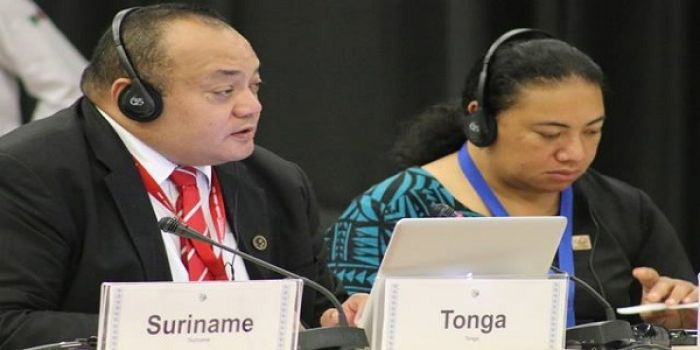Tonga supports marine resource planning Featured
 DPM, Hon. Siaosi Sovaleni with Director of Environment, Ms. Lupe Matoto in Mexico. Photo: MEIDECC
DPM, Hon. Siaosi Sovaleni with Director of Environment, Ms. Lupe Matoto in Mexico. Photo: MEIDECC
8 December 2016. The Pacific Island Countries strongly believes in the manifold benefits of a good marine resource planning which ensures a balance between conservation and sustainable use of resources by the people.
Tonga’s Deputy Prime Minister, Hon Siaosi Sovaleni made that statement while speaking during the Thirteenth Conference of the Parties to the Convention on Biological Diversity (CCBD COP13) in Cancun, Mexico this week.
Hon Sovaleni told the meeting he was speaking on behalf of the Pacific Island Countries who were present at the meeting.
“The Pacific Island Countries strongly believes in the manifold benefits of marine spatial planning approaches for ensuring a balance between the conservation and sustainable use of coastal and marine biodiversity and resources across all relevant sectors with a stake in coastal and marine environments,” Hon Sovaleni said.
“Therefore, we appreciate the range of activities that have been organized and undertaken by the Executive Secretary and the Sustainable Ocean Initiative with regards to facilitating marine spatial planning approaches and urges Parties to adopt the draft decision as recommended by SBSTTA-20.”
Hon Sovaleni then led the call by the Pacific Islands for the different countries represented at the meeting to implement the use of Marine Spatial Planning for the long-term protecting of coastal and marine areas.
“Considering the inherent linkages between marine spatial planning and area-based management tools, Pacific Island Countries call upon Parties to make use of Marine Spatial Planning in the identification of suitable management measure for the long-term protection of coastal and marine areas, including in particular ecologically or biologically significant marine areas (EBSAs),” he said.
He noted that during the Sustainable Ocean Initiative Regional Capacity Development workshop for the South Pacific, participants took note of the importance of integrated ocean management.
Participants discussed the importance of improving information on cold water habitats and deep sea biodiversity for use in marine spatial planning.
Participants also discussed about marine debris and the need to implement the voluntary guidance and to mainstream this guidance within port authorities, marine transport and sea bed mining sectors, and regional fisheries bodies.
Hon Sovaleni said that while discussing the issue of underwater noise, there was emphasis for the need to take a precautionary approach.
“However, we also want to emphasise that further work should be built on existing research and that the emphasis should be on implementation,” he said.
In relation to capacity building priorities, the Pacific Island Countries requests that the Pacific region be included in the EBSA training to reinforce the project of the expected criteria for training.
“The Pacific Island Countries strongly encourages Parties, other Government and relevant organisations to cooperate and collaborate for the timely and effective implementation of relevant and adequate capacity development activities, including through the Sustainable Ocean Initiative, that are required to enable all Parties to fulfil the mandate of the Convention on the conservation and sustainable use of marine and coastal biological diversity,” Hon Sovaleni added.
Hon Sovaleni led the Tonga delegation to the meeting with the Director of Environment Lupe Matoto and the Tonga Ridge to Reef (R2R) program manager Ta’hirih Hokafonu as the other delegation members.
- MEIDECC



